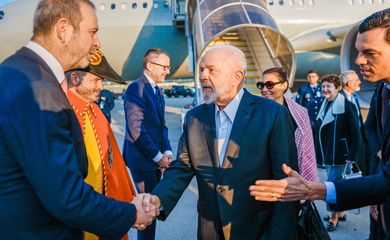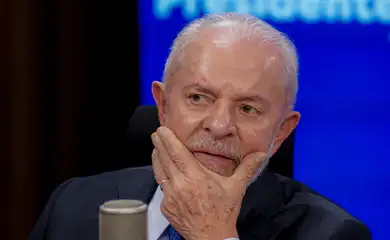There is no democracy with hunger, says Lula

On Thursday (Jun. 13), President Luiz Inácio Lula da Silva participated in the closing session of the inaugural forum of the Global Coalition for Social Justice at the 112th International Labor Organization (ILO) Conference in Geneva, Switzerland.

In his speech, Lula emphasized that the well-being of the population is closely linked to environmental preservation commitments. He advocated for a balanced relationship between capital and labor to reduce social inequalities.
Highlighting various issues that need to be addressed to improve the quality of work globally, Lula stated that the ILO is even more relevant given today's challenges. The forum, an initiative of ILO Director-General Gilbert Houngbo, will be co-chaired by Lula.
"There is no democracy with hunger, no development with poverty, no justice with inequality. That's why I accepted Director General Gilbert's invitation to co-chair the Global Coalition for Social Justice. This coalition will be instrumental in implementing the 2030 Agenda for Sustainable Development. SDG 8 [Sustainable Development Goal 8] on Decent Work for All is not advancing at the speed and scale necessary to meet its indicators," said Lula, emphasizing that "informality, precariousness, and poverty remain persistent."
Informal jobs
"The number of individuals in informal jobs has jumped from approximately 1.7 billion in 2005 to 2 billion this year. Income from work continues to decline for the less educated. The new generations can't find their place in the market. Many neither study nor work, and there is a high level of discouragement. Nearly 215 million people, more than the population of Brazil, live in extreme poverty despite being employed. Gender, race, sexual orientation, and geographical origin inequalities further aggravate this scenario," he said.
For Lula, the relationship between capital and labor is crucial for reducing social inequalities. "Restoring the role of the state as a development planner is an urgent task. The invisible hand of the market only exacerbates inequalities. Productivity growth has not been matched by rising wages, leading to dissatisfaction and significant polarization. You can't discuss economics and finance without addressing employment and income. We need a new form of globalization—a globalization with a human face," he noted.
The president advocated for taxing the super-rich and emphasized that social justice and the fight against inequality are priorities for Brazil's G20 presidency. "We are discussing how to promote a just transition and leverage emerging technologies to improve the world of work. Our priority initiative, the Global Alliance against Hunger and Poverty, aims to accelerate efforts to eliminate these scourges. Brazil is actively promoting the proposal to tax the super-rich in the G20 debates," he added.
"Never before has the world had so many billionaires. We're talking about 3,000 people with almost $15 trillion in assets. That's the combined wealth of Japan, Germany, India, and the United Kingdom. It exceeds what developing countries are estimated to need to address climate change. The concentration of income is so absurd that some individuals have their own space programs. We don't need to seek solutions on Mars. It's Earth that requires our care," added the president, referring to billionaire Elon Musk, owner of the space exploration company SpaceX.
Finally, the president stressed the importance of launching the coalition and reiterated his call for greater participation by developing countries in global governance bodies.
"It makes no sense to ask developing countries to help resolve today's global crises without ensuring their adequate representation in major global governance bodies. Our decisions will only have legitimacy and effectiveness if they are made and implemented democratically," he stated.
Global Coalition
Launched last year, the Global Coalition for Social Justice already boasts over 250 members, including governments, workers' and employers' organizations, multilateral and national organizations, financial and academic institutions, and international non-governmental organizations.
The International Labor Conference, the annual meeting of the ILO's 187 member states, is being held this year from June 3 to 14.



